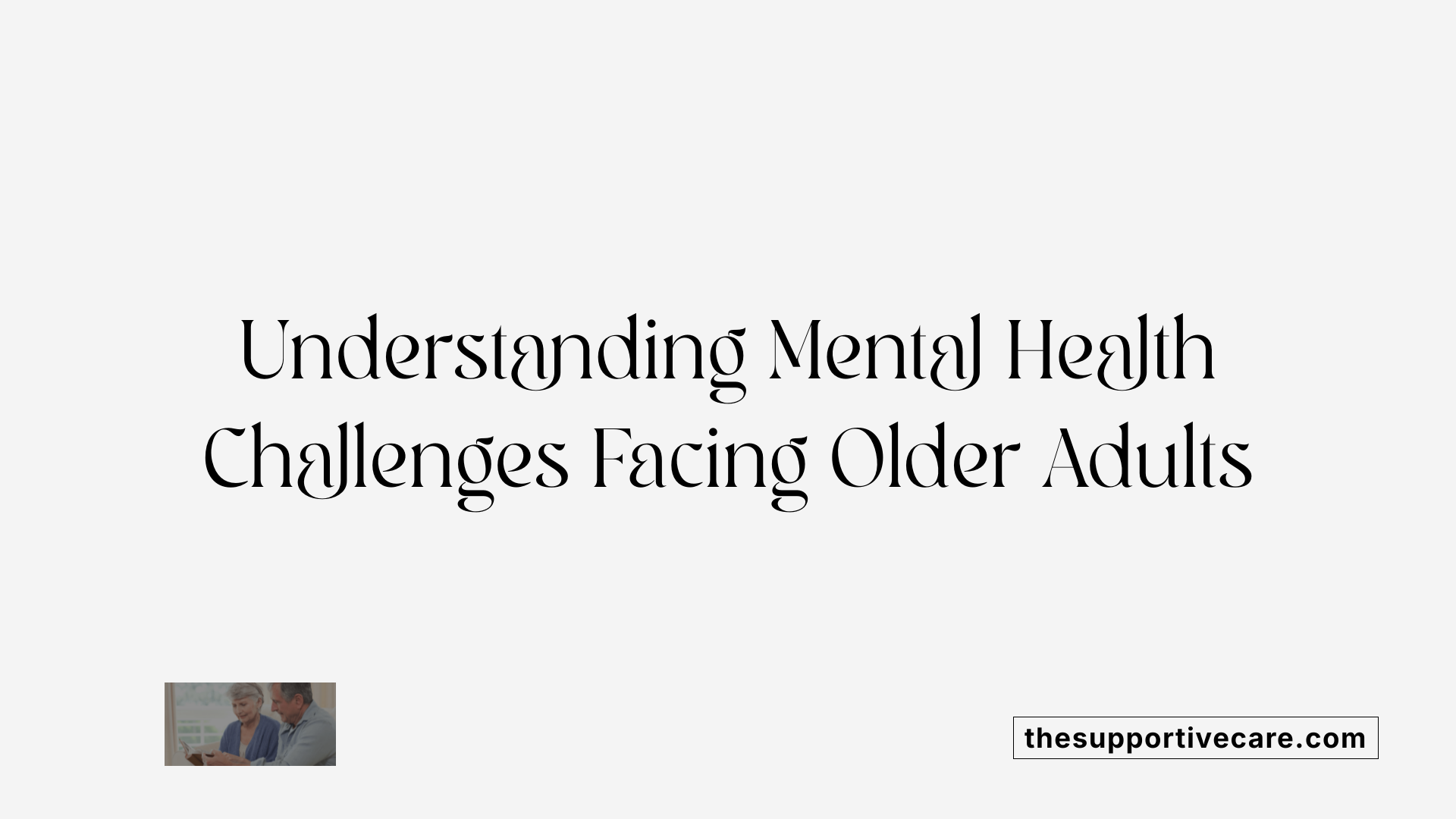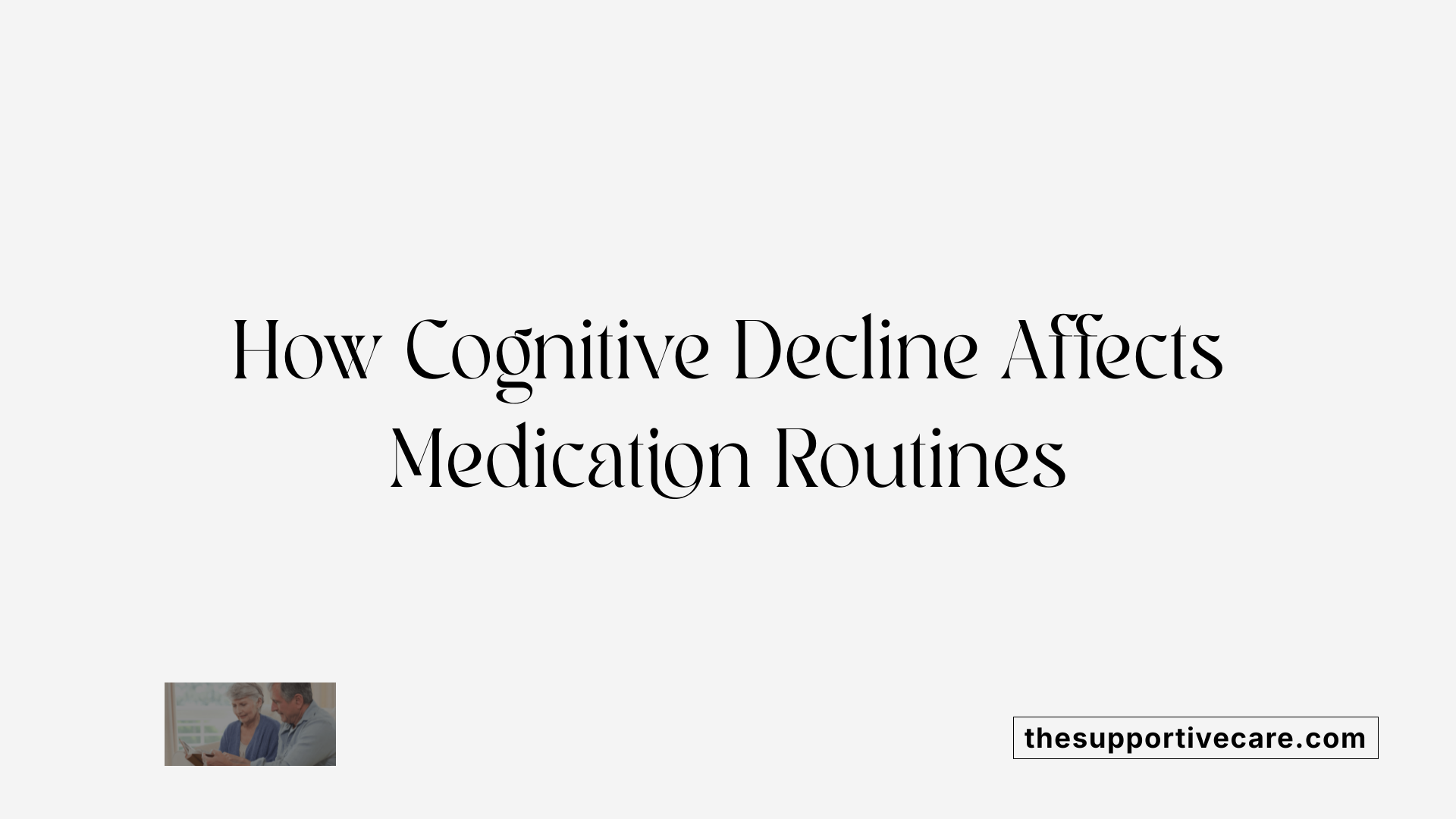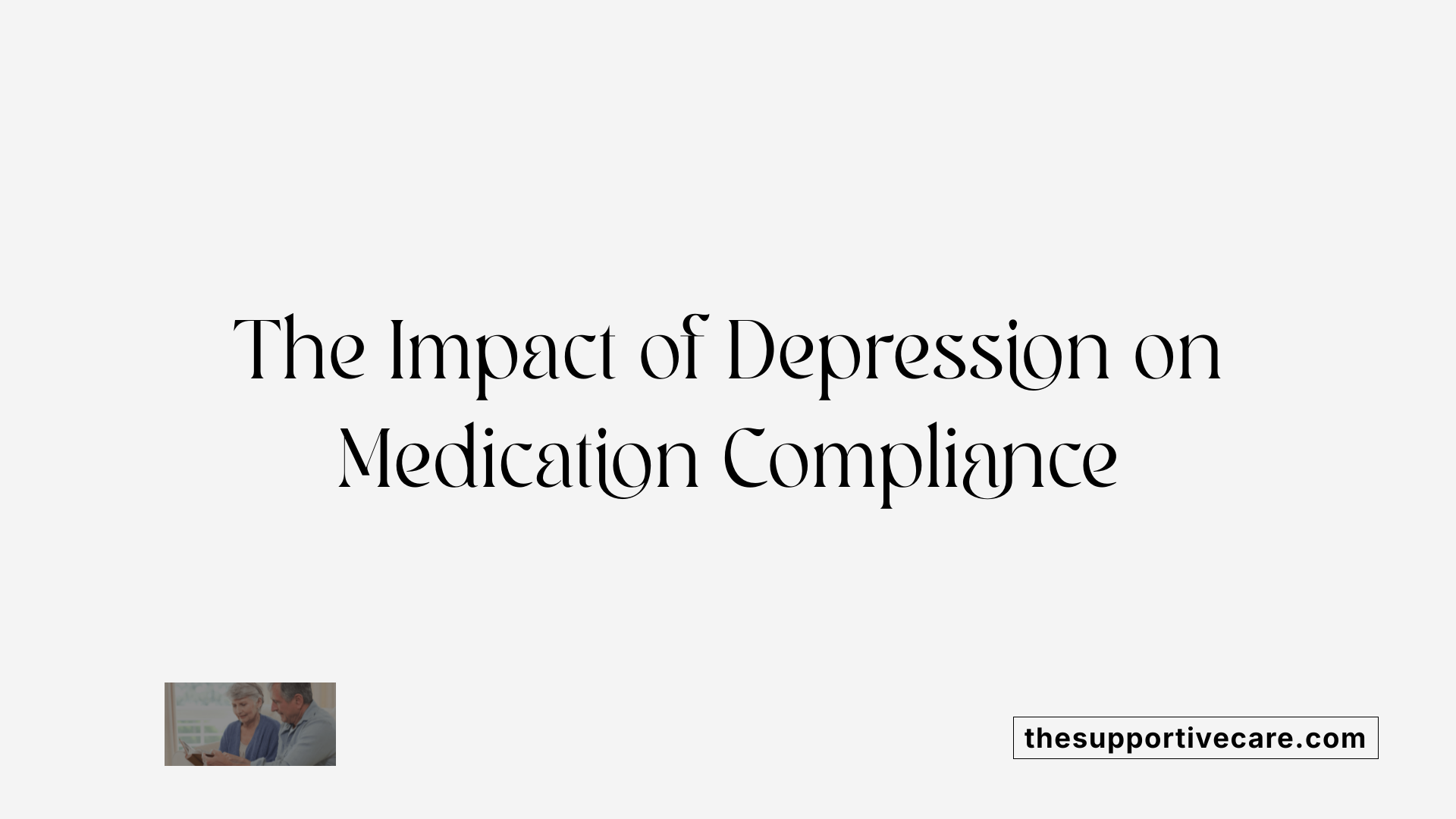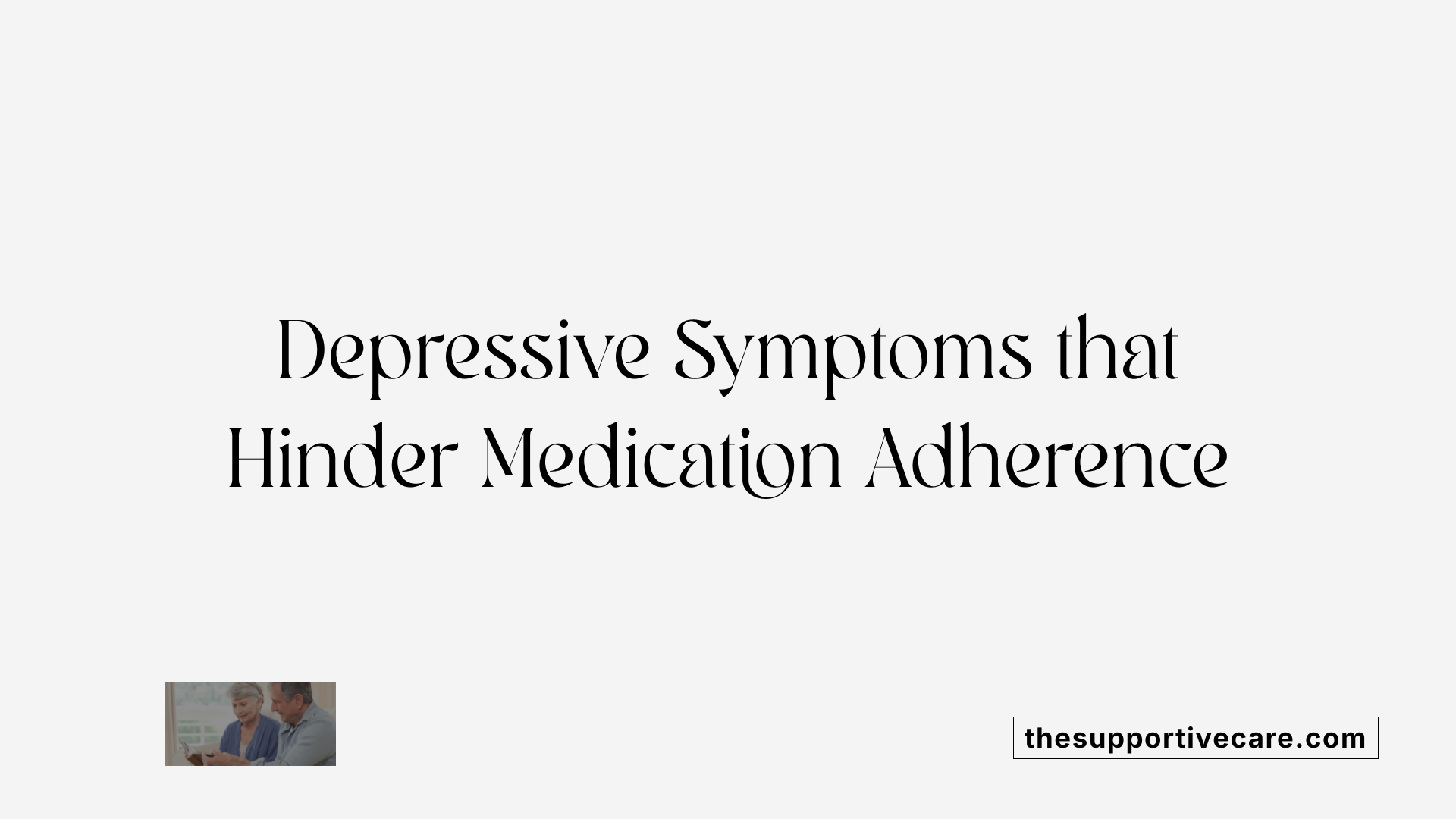Understanding the Intersection of Mental Well-Being and Medication Use in Older Adults
Medication adherence among older adults is a complex issue influenced by numerous factors, with mental health playing a pivotal role. As the elderly population grows, recognizing how conditions like depression, anxiety, and cognitive decline impact medication-taking behaviors is essential for improving health outcomes. This article explores the intricate relationship between mental health and medication adherence, examining risk factors, barriers, and strategies to enhance compliance among seniors.
Overview of Mental Health Challenges in the Elderly

What are the main mental health concerns in older populations?
Mental health issues are common among older adults and can significantly impact their quality of life. The primary concerns include depression, dementia, anxiety, and substance abuse.
Depression affects approximately 5-7% of the elderly population and is often linked with other health issues, social isolation, and life transitions. Dementia, including Alzheimer's disease, has similar prevalence rates and poses challenges with cognitive decline and memory loss.
Anxiety disorders are also prevalent, with around 3.8% of older individuals experiencing significant anxiety symptoms. These mental health issues are often compounded by social factors such as loneliness, loss of loved ones, and physical health decline.
Cognitive difficulties like memory problems, concentration issues, and impaired judgment are early signs of dementia and other neurological conditions. Suicidal rates tend to increase with age, particularly among those aged 85 and above.
Early detection of symptoms such as persistent sadness, hopelessness, mood swings, and changes in behavior is essential for timely intervention. Approaches like social engagement programs, psychotherapy, physical activity, and music therapy have proven beneficial.
Managing mental health proactively through medical care, supportive social networks, and lifestyle changes can greatly enhance well-being in older adults. Recognizing and addressing these issues early is vital for improving life quality and overall health outcomes.
This overview underscores the importance of regular mental health assessments and integrated care strategies for the aging population.
For more information, search using the query: "Prevalence and impact of mental health issues in older adults."
Cognitive Decline and Medication Adherence

How does mental health influence medication adherence?
Mental health plays a crucial role in determining how well older adults stick to their medication regimens. Conditions such as depression, anxiety, and cognitive impairments can diminish motivation and impair understanding, making it more difficult for seniors to follow their prescribed treatments consistently.
Research indicates that better mental health is associated with higher medication adherence. For example, seniors experiencing depressive symptoms often report difficulty in maintaining medication routines, partly due to loss of interest, fatigue, concentration issues, feelings of worthlessness, and thoughts of suicidal ideation. These symptoms can lead to significant nonadherence, increasing the risk of worsened health outcomes.
Conversely, addressing mental health issues can enhance medication-taking behaviors. Strategies like targeted interventions—psychoeducation, counseling, and behavioral coaching—have shown to improve adherence. Additionally, assessing individual depressive symptoms using symptom-specific tools allows healthcare providers to tailor interventions more effectively.
Impact of cognitive impairment on adherence
Cognitive decline, particularly mild cognitive impairment (MCI), poses a notable challenge for medication adherence among the elderly. MCI is characterized by MMSE scores ranging from 21 to 24.
Studies reveal that older adults with mild cognitive impairment tend to have lower adherence rates compared to those with normal cognition. Interestingly, severe impairment does not always show a significant difference, possibly because individuals with more advanced impairment often receive additional support from caregivers.
Cognitive issues such as memory loss are the most common reasons reported for nonadherence, with about 73% of seniors citing poor memory as a barrier. These deficits hinder the ability to remember dosing schedules, understand medication instructions, and manage multiple prescriptions.
Assessment tools for cognitive status
Early identification of cognitive decline is vital for implementing effective adherence strategies. Several tools are used to evaluate cognitive status, including the Mini-Mental State Examination (MMSE), Montreal Cognitive Assessment (MoCA), and other brief cognitive screening instruments.
Incorporating cognitive assessments into routine care helps identify individuals at risk of nonadherence. Recognizing early signs allows healthcare providers to introduce targeted interventions, such as caregiver support, simplified medication regimens, or reminder systems, thereby enhancing adherence and improving overall health outcomes.
| Assessment Tool | Suitable For | Key Features |
|---|---|---|
| MMSE | General cognitive screening | Quick, widely used, assesses orientation, memory, attention |
| MoCA | Mild cognitive impairment detection | More sensitive, evaluates executive function |
| Memory Questionnaires | Memory recall issues | Self-reported, supplement with caregiver input |
Careful evaluation of mental health and cognition enables a holistic approach to improving medication adherence in the elderly, addressing both psychological and physiological barriers.
The Impact of Mild Cognitive Impairment and Memory Issues
What are the factors affecting medication adherence in elderly people?
Medication adherence among elderly individuals is influenced by various factors, including cognitive and psychological health, social support, health literacy, and socioeconomic status. Cognitive impairment, particularly mild cognitive impairment (MCI), plays a significant role. Studies show that elderly persons with MCI, indicated by MMSE scores between 21-24, tend to have lower adherence compared to those with normal cognition.
Memory issues are the most common reason for not taking medications as prescribed. Approximately 73% of older adults reporting nonadherence cite poor memory as a barrier. These memory-related challenges can lead to missed doses and inconsistent medication routines.
Beyond memory problems, other factors such as depression—especially depressive symptoms like loss of interest, fatigue, and concentration difficulties—are linked to lower adherence. Anxiety and fatalistic beliefs about health can also negatively impact adherence behavior.
To address these issues, healthcare providers often use assessments of mental health, including cognitive status evaluations, to identify patients at risk. Early detection of cognitive decline allows for targeted strategies to improve adherence, such as simplified regimens and reminder systems.
Interventions that support memory, like electronic reminders, alarms, and external aids, can help mitigate the effects of cognitive decline. Personalization of adherence strategies, including caregiver involvement and behavioral techniques, has demonstrated promising results.
Overall, understanding the impact of cognitive impairment and memory issues is crucial for developing effective interventions to enhance medication adherence in the elderly population.
| Cognitive Status | Effect on Adherence | Additional Notes |
|---|---|---|
| Normal cognition | Higher adherence | Baseline comparison |
| Mild impairment | Lower adherence | Significant impact |
| Moderate to severe | No significant difference | Severity may alter adherence |
Addressing these cognitive barriers directly can substantially improve health outcomes for older adults, making routine cognitive assessments and memory support tools essential components of managing medication regimens in aging populations.
Depression and Its Effect on Adherence

How does mental health influence medication adherence?
Mental health plays a pivotal role in medication adherence among older adults. When mental well-being is compromised, particularly through conditions like depression, patients often experience decreased motivation to follow their medication regimens. Depression can impair cognitive functions such as concentration and memory, making it harder to remember doses or understand the importance of consistent treatment.
Research has shown that depressive symptoms are closely linked to higher rates of nonadherence. Specific symptoms such as loss of interest, fatigue, concentration problems, feelings of worthlessness, and suicidal thoughts are associated with lower adherence levels. For example, loss of interest in health or treatment often leads to neglecting medication routines.
On a broader scale, mental health issues affect a person's ability to engage actively in their care, impacting overall health outcomes. Interventions that assess and address mental health conditions—such as targeted counseling or psychiatric support—can significantly improve adherence. Moreover, personalized strategies, including psychoeducation, reminders, and motivational techniques, help overcome barriers caused by mental health challenges.
Conversely, positive mental health and strong therapeutic relationships enhance medication-taking behaviors. Factors like social support, clear communication, and shared decision-making foster adherence. Healthcare providers can improve outcomes by routinely screening for mental health symptoms, especially depression, and tailoring interventions accordingly.
In summary, mental health, especially depression, markedly influences medication adherence. Effective management of mental health symptoms through both clinical and behavioral strategies is vital to ensure patients follow their prescribed treatments, ultimately improving health and quality of life.
Specific Symptoms of Depression Influencing Nonadherence

What barriers related to mental health hinder medication adherence in older adults?
Depression and anxiety are common mental health issues that significantly impact medication adherence among older adults. These conditions can diminish motivation, making it harder for individuals to maintain consistent medication routines.
Specific depressive symptoms, such as loss of interest in daily activities, fatigue, and concentration problems, are strongly associated with higher rates of nonadherence. For example, loss of interest (measured by BDI item 12) consistently predicts missed doses, as patients may feel unmotivated or indifferent towards their health management.
Fatigue can sap energy levels, reducing the capacity to organize and follow medication schedules. Concentration issues mean that remembering to take medications on time becomes more challenging, leading to missed doses or errors.
Beyond these symptoms, feelings of worthlessness and suicidal thoughts further decrease engagement with health behaviors, including medication adherence. Such psychological states can foster neglect of self-care routines or diminish belief in the effectiveness of treatment.
These mental health barriers are not only individual symptoms but also reflect broader issues like reduced insight and cognitive impairments, which complicate medication management.
Addressing these barriers requires integrated approaches that include psychological support, tailored interventions, and ongoing mental health management. By doing so, healthcare providers can improve adherence and overall health outcomes for older adults facing mental health challenges.
Impact of Health Anxiety and Fatalism

How does mental health influence medication adherence?
Mental health plays a crucial role in determining how well elderly patients stick to their medication regimens. Poor mental health, especially depressive symptoms such as loss of interest, fatigue, and concentration problems, can significantly diminish motivation to adhere to prescribed therapies. Anxiety and depressive states may foster feelings of worthlessness or hopelessness, further discouraging consistent medication use.
Research shows that the presence of depressive symptoms closely correlates with higher rates of medication nonadherence in older adults with chronic neurological illnesses. Specific symptoms like feelings of worthlessness or suicidal thoughts are consistent predictors of poor adherence across various analyses.
Interventions that target mental health, including tailored counseling, psychoeducation, and evidence-based behavioral strategies like motivational interviewing, can improve adherence rates. Addressing mental health issues either directly or indirectly influences patients' capacity to manage their health, leading to better clinical outcomes and quality of life.
Relationship between health beliefs and adherence
Patients’ perceptions about their health and medications significantly shape their adherence behaviors. For instance, health anxiety—a tendency to worry excessively about health—has been associated with lower medication adherence (correlation coefficient r = -0.187, P = 0.008). This means that individuals with heightened health anxiety may either overuse or underuse their medications due to fears or misconceptions.
Similarly, fatalistic beliefs—thinking that health outcomes are predetermined or beyond personal control—also negatively impact adherence (r = -0.160, P = 0.024). When elderly individuals believe that nothing they do can influence their health, they are less likely to follow prescribed medication routines.
Addressing these beliefs through psychological interventions, education, and counseling can modify perceptions and improve adherence. Enhancing health literacy and providing reassurance can mitigate health anxiety, while fostering a sense of control and personal responsibility can counteract fatalistic attitudes.
Effects of health anxiety and fatalism
Both health anxiety and fatalism are psychological factors that can hinder effective medication management among older adults. Elevated health anxiety may lead to obsessive checking of symptoms or unnecessary medication use, whereas fatalistic beliefs often result in neglecting medication altogether.
The interaction of these factors underscores the importance of a holistic approach in clinical care—one that considers psychological state alongside physical health. Customized interventions that include cognitive-behavioral therapy, motivational interviewing, and patient education are shown to be effective.
Understanding and addressing these health beliefs create opportunities for healthcare providers to implement tailored strategies that enhance medication adherence, ultimately supporting better health outcomes for elderly populations.
Meta-Analysis on Depression and Medication Nonadherence
What research findings support the link between mental health and medication adherence?
A comprehensive systematic review and meta-analysis have demonstrated a significant connection between depression and medication adherence in older adults, particularly those suffering from cardiovascular disease (CVD). The analysis revealed that depression substantially impairs adherence, with an odds ratio of 0.603. This figure indicates that depression decreases the likelihood of medication adherence by roughly 40%.
Most of the included studies consistently reported an inverse relationship between depression and adherence, underscoring the critical influence of mental health on medication compliance. The findings advocate for routine depression screening in elderly patients with chronic illnesses and highlight the necessity of integrating mental health support with traditional disease management to promote better adherence outcomes.
Such evidence emphasizes that addressing depressive symptoms can lead to meaningful improvements in medication-taking behaviors, ultimately contributing to better health outcomes in the aging population.
Interventions Supporting Medication Adherence in Older Adults
What role do interventions play in improving medication adherence?
Interventions are crucial in helping older adults take their medications properly and consistently. These programs often include behavioral modification strategies such as counseling, motivational interviewing, and cognitive-behavioral therapy. These tailored approaches aim to address individual patient barriers and motivate changes in behavior.
Face-to-face counseling sessions are highly effective, providing personal support and direct engagement with healthcare providers. Telehealth and digital interventions, like web-based programs and mobile apps, are also used, although their effectiveness varies.
Educational initiatives grounded in health belief models can enhance understanding and motivation, further supporting adherence. Additionally, strategies such as medication reminders, social support networks, and real-time monitoring through digital tools help reinforce medication routines.
Multi-component programs integrating these elements—education, behavioral techniques, and technological support—have demonstrated meaningful improvements in adherence rates.
However, the most effective methods continue to be evaluated as research advances. Overall, tailored, interactive interventions focusing on individual needs are most promising in promoting consistent medication use among older adults.
Digital Technologies and Medication Management
What are some technological strategies used to improve adherence?
Technological strategies employed to boost medication adherence among older adults primarily involve digital health tools like mobile applications. These apps incorporate various features such as reminders, alerts, and dashboards that help patients organize and manage their medications more effectively.
One of the main focuses in app development is addressing common barriers like forgetfulness and alert fatigue. To do this, many apps include customizable reminder settings, visual cues, and motivational elements such as rewards or gamification. These features encourage consistent medication-taking behavior and make the process engaging.
The design of these mobile health applications emphasizes contextual sensitivity, meaning they are tailored to meet the specific needs of elderly users. This involves easy-to-navigate interfaces, clear text, and adjustable alert systems that consider sensory or cognitive limitations.
Evidence about the overall effectiveness of these technological strategies shows mixed results. However, integrated apps that combine multiple features—like educational resources, social sharing options, and personalized support—have shown promise in improving medication habits.
Moreover, these tools often serve as complements to behavioral interventions, enhancing motivation and adherence through continuous engagement and tailored feedback. The emphasis remains on creating user-friendly, accessible, and engaging digital solutions to support medication management in the elderly.
In summary, mobile health applications with multi-faceted features—such as reminders, alerts, dashboards, education, and social connectivity—are at the forefront of digital strategies aimed at improving medication adherence in older populations. Their success relies on personalization, ease of use, and addressing specific barriers faced by seniors.
Barriers and Facilitators to Using Digital Health Tools
What barriers related to mental health hinder medication adherence in older adults?
Mental health issues significantly impact the ability of older adults to adhere to medication regimens. Conditions such as depression and anxiety are particularly influential, as they can diminish motivation and lead to neglect of routine health management. For instance, depressive symptoms like feelings of worthlessness, loss of interest, fatigue, and concentration problems can make it difficult for individuals to remember or prioritize taking their medications.
Moreover, mental health challenges often result in poor insight into one's health condition and treatment needs. This lack of awareness can cause patients to underestimate the importance of adherence or to feel overwhelmed, reducing engagement with healthcare plans.
Feelings of hopelessness and low self-efficacy further diminish the likelihood of consistent medication use. When mental health symptoms are untreated or unrecognized, they can create a cycle of nonadherence, worsening health outcomes.
Addressing these barriers involves integrating mental health support with medication adherence strategies. Cognitive behavioral therapy, motivational interviewing, and other psychological interventions can help improve mental wellbeing, which in turn can enhance adherence.
Incorporating mental health screening and providing tailored psychological support are vital steps for healthcare providers aiming to boost medication adherence in this vulnerable population.
Strategies to improve acceptance
To promote the use of digital health tools among older adults, strategies need to address common barriers such as low health literacy, alert fatigue, lack of motivation, and social support deficits.
Designing user-friendly interfaces that are simple and easy to navigate can help overcome technological resistance.
Providing education about the benefits and functions of digital tools increases acceptance and reduces anxiety about new technology.
Involving caregivers and family members in training and ongoing use ensures a support system that encourages sustained engagement.
Personalizing alerts and reminders to reduce alert fatigue and aligning features with individual health goals can enhance perceived usefulness.
Finally, ensuring privacy and data security builds trust, making older adults more comfortable adopting these tools.
Overall, combining technological design improvements with education and social support enhances acceptance and promotes consistent use of digital health interventions for medication adherence.
Concluding Thoughts and Future Directions
Emerging research and need for integrated approaches
Recent studies highlight the complex relationship between mental health, cognition, and medication adherence in older adults. It’s clear that addressing psychological factors like depression, health anxiety, and fatalistic beliefs is crucial for improving adherence. Research increasingly supports comprehensive, multifaceted strategies tailored to individual needs, including behavioral interventions, social support, and coordinated healthcare delivery.
Furthermore, mental health assessment tools, including screening for depressive symptoms and cognitive decline, can pinpoint at-risk patients, enabling targeted interventions. The evidence suggests that integrating mental health care with chronic disease management could significantly enhance adherence outcomes.
Potential technology innovations
Technological solutions also show promise in tackling adherence barriers. Mobile applications designed with input from older adults can deliver reminders, educational resources, and social engagement, combating issues like alert fatigue and poor health literacy. New developments in digital health, such as biosensors, digital pills, and smart medication dispensers, offer real-time adherence monitoring, providing immediate feedback and support.
However, the effectiveness of these technological interventions varies. Combining digital tools with face-to-face counseling and personalized behavioral strategies appears most promising. As research advances, future innovations should focus on user-centered design, ensuring tools are accessible, engaging, and tailored to the specific needs of the elderly population.
Overall, a future-oriented approach that combines behavioral, social, and technological strategies, grounded in ongoing research, will be vital in improving medication adherence among older adults with mental health challenges.
Moving Forward with Mental Health-Centric Strategies
Enhancing medication adherence in older adults requires a comprehensive understanding of the influence of mental health. Addressing mental health issues through targeted psychological interventions, integrated care models, and innovative technologies can significantly improve compliance rates. Ongoing research and personalized care strategies will be vital in developing effective solutions that account for the unique mental health challenges faced by the elderly, ultimately leading to better health outcomes and quality of life.
References
- PREDICTORS OF MEDICATION ADHERENCE IN THE ELDERLY
- Impact of depressive symptoms on medication adherence in older ...
- Association of health anxiety, fatalism and medication adherence ...
- Relationship Between Depression and Medication Adherence in ...
- Effects of medication adherence interventions for older adults with ...
- MedHerent: Improving Medication Adherence in Older Adults With ...
- Effect of medication adherence on quality of life, activation measures ...
- Frailty and medication adherence among older adult patients with ...
- Factors associated with medication adherence in older patients: A ...
- Predictors of Medication Adherence in the Elderly - Sage Journals


































































































